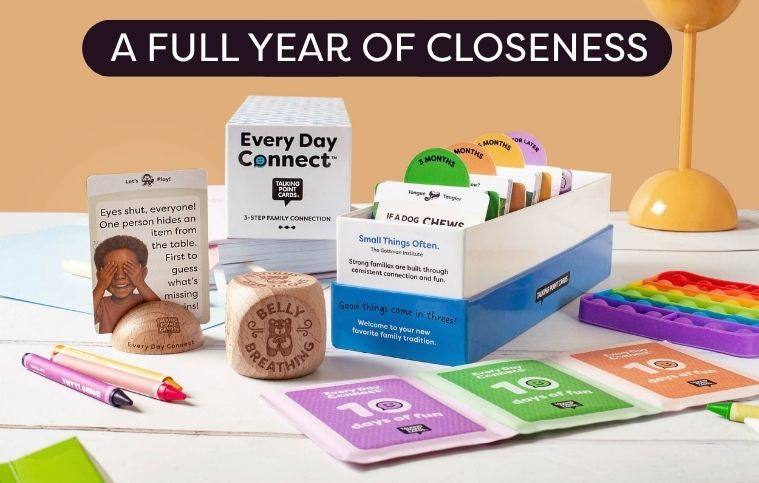SHOP
About
The Stories We Never Think To Ask
What Happens When We Don't Ask
The Magic of the Right Question
Why These Conversations Matter More Than We Think
The Lost Art of Actually Listening
Creating Space for Stories
The Questions That Change Everything
What We Gain When We Ask
The Legacy We're Actually Leavings
Making It Happen in Your Own Family
The Stories That Are Waiting
Shop Family Products
Last Tuesday afternoon, my 9-year-old daughter asked my mom the most random question: "Grandma, what was the weirdest food you ever ate when you were my age?"
I was half-listening from the kitchen, expecting something about vegetables or maybe that time Mom tried sushi. But what came next stopped me dead in my tracks.
"Well," my mom started, settling into her storytelling voice, "during the war, we didn't have much food. One winter, your great-grandmother made soup from potato peels and dandelion leaves we picked from the yard. I thought it was the most disgusting thing ever... until I realized it probably kept us from starving."
My daughter's eyes went wide. During the war? She'd never heard this story. Neither had I, actually.
And just like that, I realized how many stories were sitting right there in our living room – stories that might disappear forever if we never thought to ask the right questions.
The Stories We Never Think to Ask
Here's the thing about family stories: they're everywhere, but they're also incredibly fragile. They live in the spaces between "How was your day?" and "Pass the potatoes." They hide behind assumptions that someone else has already heard them, or that they're not interesting enough to share.
But kids? Kids don't know which stories are supposed to be "boring." They haven't developed our adult filters that make us think, "Oh, that's just normal life stuff." To them, the fact that Grandpa once hitchhiked across three states to get to a job interview is absolutely fascinating. The time Grandma accidentally dyed her hair green before her first date? Pure gold.
The problem is, we rarely create the right conditions for these stories to come out naturally. Family dinners turn into logistics meetings about who's picking up whom tomorrow. Holiday gatherings become performances where everyone's "fine" and conversations stay safely on the surface.
And meanwhile, all these incredible stories – the ones that would help our kids understand where they came from, who their people really are – they just sit there, waiting for someone to ask the right question.
What Happens When We Don't Ask
I think about my own grandmother, who passed away when I was in college. She lived through the Great Depression, raised four kids mostly on her own when my grandfather was deployed overseas, and somehow managed to keep everyone fed and clothed on basically nothing.
But you know what I remember most about her? That she made the best chocolate chip cookies and always had butterscotch candies in her purse.
It's not that those aren't lovely memories – they are. But I can't help wondering: what was she thinking about during those long nights when my grandfather was away? How did she manage to stay so optimistic when everything was falling apart around her? What would she want me to know about resilience, about making do, about finding joy in small things?
Those stories died with her. And now my own kids will never get to hear them.
This is what happens when we wait. When we assume there will always be more time, more opportunities, more family dinners where the stories will just naturally emerge.
Except they don't – at least not without a little help.
The Magic of the Right Question
But back to that Tuesday afternoon. After the potato peel soup story, my daughter was hooked. She started firing off questions: "What games did you play?" "Did you have a favorite hiding spot?" "Were you ever scared?"
Each question unlocked another story. My mom told us about the time she and her sister snuck out to go to a dance and got caught by their father waiting on the porch when they came home. About her first job at the local five-and-dime, where she accidentally knocked over an entire display of hair ribbons on her first day. About the neighbor who taught her to drive in his beat-up Chevy because her own father was too nervous to sit in the passenger seat.
My son wandered over, drawn by the laughter. Before I knew it, we were all sitting there, completely captivated by these glimpses into my mom's childhood that felt both foreign and familiar at the same time.
That's when it hit me: these weren't just random stories. They were pieces of who my mom is, explanations for her quirks and strengths and fears that I'd never quite understood before. And more importantly, they were becoming part of my kids' understanding of themselves – where their stubbornness comes from (definitely great-grandma), why family dinners are so important to me (because my mom learned early that sharing food means sharing love), why we don't give up easily on things that matter.
Why These Conversations Matter More Than We Think
Research shows that family storytelling provides meaningful ways of strengthening intergenerational ties and maintaining cultural traditions, but honestly, you don't need a study to tell you that. You can see it happening in real time when a kid's whole face lights up as they discover that their quiet grandfather was once a bit of a rebel, or that their gentle grandmother was the one who stood up to the neighborhood bully.
These stories do something that no history book or family tree can do: they make the past feel alive and relevant. They help kids understand that the adults in their lives weren't always adults – that they were once scared and brave and silly and uncertain, just like they are now.
And for the storytellers? There's something magical about watching a child hang on your every word, about seeing your own experiences reflected back as fascinating rather than mundane. It's about the transfer of knowledge and traditions from one generation to the next, sure, but it's also about feeling seen and valued in a way that's increasingly rare in our hurried world.
The Lost Art of Actually Listening
I've been thinking a lot about why that afternoon felt so special, and I think it comes down to this: we were all actually present. No phones, no distractions, no agenda other than genuine curiosity about each other.
When was the last time you sat with an older family member and just... listened? Not waiting for your turn to talk, not thinking about your to-do list, not trying to steer the conversation toward practical matters. Just listening with the kind of wide-open attention that kids naturally bring to stories.
It's harder than it sounds, especially for those of us who are used to managing everyone's schedules and keeping conversations moving along efficiently. But that slowness, that willingness to wander down conversational rabbit holes – that's where the good stuff lives.
My mom told us about the time she got lost in the woods behind her house and spent hours convinced she'd never find her way home, only to discover she was about fifty yards from her back door the whole time. To an adult, it might sound like a silly childhood mishap. To my kids, it was an epic adventure story that somehow made their grandmother seem both more human and more heroic at the same time.
Creating Space for Stories
The thing is, these conversations don't just happen on their own – at least not in most families. We need to create space for them, both literally and figuratively.
Literally means setting aside time when everyone's together without competing demands. Maybe it's Sunday afternoon coffee, or the time right after dinner before everyone scatters to their own activities. Maybe it's during long car rides or while doing dishes together.
But figuratively is just as important. It means approaching our elders with genuine curiosity rather than polite obligation. It means being willing to hear stories that might be sad or complicated or that don't fit neatly into our family narrative. It means asking follow-up questions and sitting with comfortable silences while someone searches their memory for details.
Most importantly, it means asking the kinds of questions that invite stories rather than just information. Instead of "What was school like when you were young?" try "What's the most trouble you ever got into at school?" Instead of "Tell me about your job," try "What's the worst boss you ever had?" or "What made you feel proud at work?"
The difference is subtle but huge. One invites a recitation of facts; the other invites a story with characters and conflict and emotional resonance – the kinds of stories that stick with us long after the conversation ends.
The Questions That Change Everything
After that magical afternoon, I started paying attention to which questions sparked the best stories. I noticed that my mom would light up when asked about specific moments rather than general experiences. "What was your wedding day like?" got a nice but predictable response. "What went wrong on your wedding day?" got a hilarious story about a flower girl who decided to take a nap in the middle of the ceremony and a best man who forgot the rings in his other jacket.
The best questions seem to have a few things in common: they're specific rather than vague, they often focus on challenges or unexpected moments rather than just happy memories, and they invite emotional as well as factual responses.
Questions like: "What's something you believed as a kid that turned out to be completely wrong?" or "When did you first feel really grown up?" or "What's the bravest thing you've ever done?" These aren't the kinds of questions we typically ask in casual conversation, but they're the ones that reveal the most about who someone really is.
And here's what I love about approaching family stories this way: it works both directions. My kids have started asking me these kinds of questions too, and I find myself sharing stories I haven't thought about in years. Stories about the time I got lost in a department store and convinced myself I'd been abandoned forever (I was probably missing for about three minutes). About my first job interview, where I was so nervous I forgot my own name when they asked me to introduce myself.
These aren't the kinds of stories I would have thought to share unprompted – they feel too ordinary, too silly. But to my kids, they're fascinating glimpses into the reality that their mom was once young and scared and imperfect, just like they are.

Rated #1 Generations Product
Strengthen family bonds, spark fun and meaningful conversations, and create connection that lasts.

What We Gain When We Ask
Three months after that first afternoon, family dinners at our house look completely different. We've fallen into this rhythm where someone asks a question – sometimes from a stack of conversation starters we keep on the table, sometimes just something that pops into our heads – and we see where it takes us.
My kids have learned that their great-grandfather once jumped off a bridge into a river to win a bet (and lived to regret it). That their grandmother's first kiss was with a boy named Charlie who tasted like peppermint gum and bad decisions. That their grandfather once drove fourteen hours straight to surprise his mother on her birthday, only to discover he'd gotten the date wrong and it was actually the following week.
But more than that, they've learned that the adults in their lives have rich, complex inner worlds that extend far beyond their current roles as parents and grandparents. They've learned that everyone was young once, everyone made mistakes, everyone had dreams that didn't quite work out the way they planned.
And my parents? They've started calling more often, not with logistics or updates, but with random stories they suddenly remembered and wanted to share. My mom called last week just to tell me about the time she and her best friend got caught in a thunderstorm and had to take shelter in a stranger's barn, where they ended up helping deliver a calf and getting invited to stay for dinner.
"I don't know why I thought of that," she said, "but I was driving past a farm today and it all came rushing back."
That's the thing about stories – they beget more stories. Once you start asking, once you create that space for sharing, people start remembering things they thought they'd forgotten. Family lore that seemed lost forever suddenly bubbles back to the surface.
The Legacy We're Actually Leaving
I used to think that family legacy was about big things – achievements, traditions, maybe some meaningful objects passed down through generations. And sure, those things matter. But I'm starting to think the real legacy is smaller and bigger at the same time: it's in the stories that help us understand who we are and where we came from.
When my daughter grows up, she'll probably remember that her grandmother made amazing chocolate chip cookies. But she'll also remember the story about potato peel soup during the war, and what that taught her about resilience and resourcefulness and finding ways to take care of the people you love even when times are hard.
When my son becomes a father himself, he might draw on the story about his great-grandfather jumping off that bridge – not because he'll make the same choice, but because he'll understand something about courage and recklessness and the way young men sometimes need to prove themselves, even in stupid ways.
These stories become part of how we see ourselves. They give us context for our own struggles and strengths. They remind us that we come from people who survived difficult things, who found joy in small moments, who weren't perfect but were trying their best with what they had.
Making It Happen in Your Own Family
If you're reading this and thinking about the stories in your own family that haven't been told yet, here's what I've learned: start simple, start small, and start now.
You don't need a formal family interview or a complicated recording setup (though those things are lovely if you're inclined). You just need curiosity and time and the willingness to ask questions that go a little deeper than usual.
Maybe it's keeping a small box of conversation starters handy for those moments when you're all together anyway. Maybe it's establishing a tradition of story-sharing during holiday gatherings or regular family dinners. Maybe it's just making a mental note to ask one meaningful question the next time you're chatting with an older relative.
The key is consistency rather than intensity. One story shared regularly is worth more than grand intentions that never quite materialize into action.
And remember: the best stories often come from the most ordinary moments. The time someone got spectacularly lost, or failed at something important, or had to improvise their way through an unexpected situation. The moments that felt significant at the time but have been sitting quietly in someone's memory, waiting for the right person to ask the right question.
The Stories That Are Waiting
Right now, sitting in your family, there are stories waiting to be told. Stories about first loves and last chances, about moments of unexpected courage and times when everything went hilariously wrong. Stories about how people met and why they stayed together, about dreams that came true and others that had to be let go.
Stories about what it was like to be young in a different time, to navigate challenges that your kids can't even imagine, to find hope in circumstances that seemed hopeless. Stories that would help your children understand not just what happened, but what it felt like, what it meant, how it shaped the people who shaped them.
Some of these stories are funny. Some are sad. Some are both at the same time, the way real life tends to be. All of them are part of the web of connection that holds families together across time and distance and all the little misunderstandings that accumulate over years of shared life.
But here's the thing about stories: they don't tell themselves. They need someone to ask, someone to listen, someone to recognize that what feels ordinary to the storyteller might be extraordinary to the listener.
They need someone like you, willing to slow down long enough to discover that the people you thought you knew completely still have surprises to share. Willing to create space for the stories that connect us across generations and help us understand that we're all part of something bigger than ourselves.
The stories are there, waiting. All you have to do is ask.
At Talking Point Cards, we believe that meaningful connection starts with simple, heartfelt conversations. Our collection of easy-to-use, engaging conversation starters helps families of all shapes and sizes put down their screens, lean in, and truly listen to one another - one question at a time. Because stronger families aren’t built in grand gestures - they’re built in everyday moments.
Let's Stay Connected
Love what you’re reading? There’s more where that came from. Get fresh ideas, inspiring tips, and simple ways to spark deeper conversations - delivered straight to your inbox. Because the best connections start here. Just pop in your email below to join us.
We respect your privacy. We’ll never share or sell your information. By subscribing, you agree to receive emails from us. Unsubscribe anytime.












